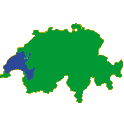Seminar on the Information Society: Region of the Future, closer to citizens

Seinäjoki, South Ostrobothnia (FIN), 8 December 2000 On 7 December 2000, the Region of South Ostrobothnia and the Assembly of European Regions (AER)organised in Seinäjoki (Finland) a reflection seminar ... Read More











